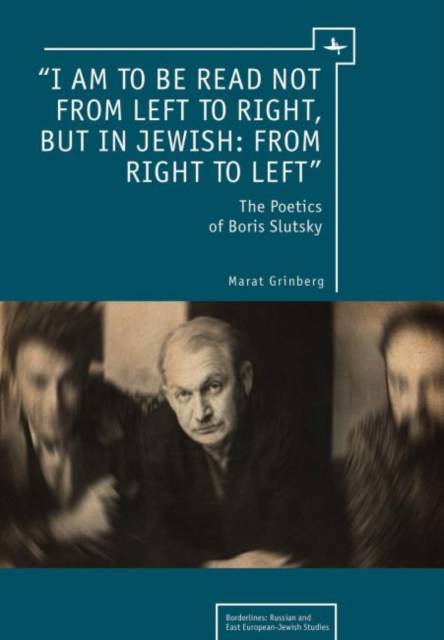
- Afhalen na 1 uur in een winkel met voorraad
- Gratis thuislevering in België vanaf € 30
- Ruim aanbod met 7 miljoen producten
- Afhalen na 1 uur in een winkel met voorraad
- Gratis thuislevering in België vanaf € 30
- Ruim aanbod met 7 miljoen producten
Zoeken
"I Am to Be Read Not from Left to Right, But in Jewish: From Right to Left"
The Poetics of Boris Slutsky
Marat Grinberg
€ 223,95
+ 447 punten
Uitvoering
Omschrijving
Boris Slutsky (1919-1986) is a major original figure of Russian poetry of the second half of the twentieth century, whose oeuvre has remained unexplored and unstudied. The first scholarly study of the poet, Marat Grinberg's book substantially fills this critical lacuna in the current comprehension of Russian and Soviet literatures. Grinberg argues that Slutsky's body of work amounts to a Holy Writ of his times, which daringly fuses biblical prooftexts and stylistics with the language of late Russian Modernism and Soviet newspeak. The book is directed toward readers of Russian poetry and pan-Jewish poetic traditions, scholars of Soviet culture and history and the burgeoning field of Russian Jewish studies. Finally, it contributes to the general field of poetics and Modernism.
Specificaties
Betrokkenen
- Auteur(s):
- Uitgeverij:
Inhoud
- Aantal bladzijden:
- 486
- Taal:
- Engels
- Reeks:
Eigenschappen
- Productcode (EAN):
- 9781934843734
- Verschijningsdatum:
- 1/01/2011
- Uitvoering:
- Hardcover
- Formaat:
- Genaaid
- Afmetingen:
- 156 mm x 234 mm
- Gewicht:
- 834 g

Alleen bij Standaard Boekhandel
+ 447 punten op je klantenkaart van Standaard Boekhandel
Beoordelingen
We publiceren alleen reviews die voldoen aan de voorwaarden voor reviews. Bekijk onze voorwaarden voor reviews.











